Table of Contents
Ever since the 1980’s boom, when trainers joined the world of street fashion, the industry has continued to grow, and there’s no sign of it slowing up. The problem is, our insatiable appetite for shiny new trainers has created a real environmental burden.
We can be sure that ethical trainers were not on the agenda back in the 80’s, or 90’s for that matter.
Luckily some brands have recognised that this industry needs to change, bringing a new wave of ethical trainers to the market, using a combination of new and traditional manufacturing techniques. Here we guide you through the technology and the brands that are putting the environment first to make ethical trainers a reality.
[Ready to rethink the way you shop online? Click here to start your ethical shopping journey now.]
The case for making trainers ethical
Globally, we now make more than 23 billion pairs of trainers every year, at a market value of over $60 billion. Sadly, we also waste trainers at a rate of 300 million pairs per year. And with the industry projected to top a value of $90 billion by 2026, this is a problem that’s not going away.
Sneaker brands have been incredibly successful at convincing us to buy a lot more than we need, especially amongst younger generations. In the UK the average teen has 6 pairs of trainers, that’s 58 million pairs in this age group alone. Meanwhile, up to 30% of these haven’t even been worn in the last 3 months.
Many people are buying trainers just to stockpile them, so it’s not hard to see how the commercial success of this industry is now taking its toll on our planet.
A heck of a lot of plastic

The problem is plastic, the main material used to make almost all trainers. And of course, plastic is made by burning oil, which is why the sneaker industry alone produces approximately 700 million tons of CO2 per year. Equivalent to running 150 million cars for the same amount of time, which works out as 13.6kg of CO2 for each pair of trainers. A heck of a lot.

We all know that plastic is not exactly environmentally friendly. It’s tough stuff, which is why it’s so practical for making trainers, but the durability of plastic is also the reason that the average pair takes around 35 years to decompose in landfill. And, it’s why our oceans already contain more than 170 million tons of it.
The second problem with trainers is that they almost always use more than one type of material, whether it’s multiple types of plastic, rubber, cotton, or canvas, the list is endless. This makes them incredibly difficult to recycle, as you need a neat way of separating these components before they can be reused in any way.
Our trainers, however much we might love them, pose a serious problem for the environment. It’s almost impossible to make plastic that doesn’t harm the environment, and it’s equally difficult to make trainers without plastic.
[Ever wondered how to find ethical fashion online? Look no further - Click here to play your part in reshaping fashion for a more sustainable future.]
New shoe tech for sustainable trainers
Fortunately some brands have stepped up to try and solve the problems posed by sneaker production, generating a push for new creative technology, and a revival of some more traditional methods, all designed to minimise the environmental impact of this troublesome industry.
Here’s snippet of what to look out for:
-
Natural rubber
The use of soft rubber in the sole of footwear is actually where the name ‘sneakers’ originated, because they were so quiet compared with traditional leather soles.
Rubber can be made synthetically by refining petroleum, and this is what you’ll find in 99% of trainers on the high street. However, rubber was originally made by tapping the extract of rubber trees, a sustainable process that doesn’t actually harm the plant.
Although this is by no means new tech, it is considerably less damaging for the planet. Many well meaning brands have begun using natural rubber as a priority because of its considerably smaller carbon footprint. And some go a step further, using FSC certified rubber that ensures good management of forests where the rubber trees are found.
-
BLOOM algae plant based foam
It turns out you can make foam from algae, the green stuff you’ll see floating on rivers, lakes and streams during the summer. When you apply heat and pressure to this protein rich biomass it undergoes a plasticisation process creating a type of foam with the soft cushioning properties needed for sporting products like trainers.
The environmental benefits are 2 fold. Excessive algal growth is a big nuisance for the environment, which is actually caused by us humans when we spray our crops with synthetic nutrients like phosphorus and nitrogen to help them grow. The problem is, it helps algae grow at an alarming rate, creating ‘blooms’ which sap oxygen from the water and destroy aquatic ecosystems. It turns out not ALL green things are good.
By harvesting algae to make foam, we proactively reduce the damaging effects of algae on the environment. And because we are substituting synthetic foam, which is made from petroleum, for a natural alternative, we also help to reduce the CO2 footprint of products utilising this BLOOM technology. It’s a win-win for sustainable trainers, and many brands have already jumped on board with this innovative step forward (R).
-
Recycled PET
PET stands for polyethylene terephthalate, a type of plastic that you don’t need to try to pronounce correctly. But it is important to know that it’s the main component of most plastic bottles, which we buy at a staggering rate of 1 million every minute. And you should know that each bottle takes more than 400 years to decompose. There is no doubt that PET makes up a large chunk of the 170 million tons of plastic already found in the oceans today.
This is even more frustrating given the fact that PET is highly recyclable. We can easily melt it down to form lower grade plastics which are perfect for the upper parts of trainers. It can even be reformed and spun to form a type of polyester yarn which can be used for knit effects and laces.
The possibilities are endless, and many brands are already integrating this material into their products. The favourite publicity line being that they are ‘cleaning the ocean to make your new sneakers’. It doesn’t quite work like that, but certainly helps us dump less and re-use more, which we won’t argue with.
-
Vegan trainers
To make completely ‘animal free’ trainers we are normally concerned with leather. A material which is problematic not only because it’s made from cows skin, but also because 85% of leather is tanned using chromium, which is considered the fourth worst pollutant in the world.
Although we shouldn’t forget things like wool, silk, felt and animal derived glue, the truth is, it’s not complicated to substitute any of these for vegan alternatives.
Leather however, with its unique properties of strength, flexibility, and shine, is still a bit problematic. The easiest way to synthesise a material like this is to use various forms of plastic. Although it is technically ‘vegan’, products that are made by burning petroleum really represent the most deceptive type of greenwashing, and certainly don’t help the wider environmental picture.
Fortunately, the technology has already been developed so that the traditional plastic alternatives to leather, like PVC, can be avoided. Products like C.W.L, a totally vegan alternative to leather, is made from cotton fabric covered with a corn based coating, producing a material that’s 63% bio-based, and almost identical in look and feel to real leather.
Other more natural alternatives include apple skin leather, grape leather, pineapple leather (piñatex), upcycled natural rubber, and cork. All are hard wearing and 100% vegan.
-
Mono material trainers
We’ve already seen that trainers are almost always made from a combination of different materials. The tough properties needed to make a sole just don’t match the softer more flexible materials we’d want for the upper part. And it’s this combination of different materials that really limits the potential for recycling trainers. Deconstruction always precedes recycling, and with trainers it’s this stage that’s a real sticking point.
One way around this is to make trainers from a single material, and now this far-fetched idea is more than science fiction. Brands like Adidas, and Native shoes, have already got the ball rolling. In particular the Adidas FutureCraft.Loop demonstrates how close we are to producing the first completely circular trainer that can be fully remanufactured, without using any virgin materials. Adidas says this product should be available to buy in the summer of 2021. Although they will be criminally expensive, this is some serious technological progress towards making sustainable trainers like never before.
The List: Brands Already Making Ethical Trainers
As you can see the technology is already available to make trainers in a more sustainable way. The question is, which brands have had the foresight to put these components together to really minimise their environmental impact.
Here we provide a list of the brands that have genuinely prioritised sustainability from the word go, where you’ll find best ethical practices represented across their full product range. These are brands making ethical trainers that we endorse, and encourage you to look at the next time you need a new pair.
Scores are based on our analysis of how each brand performs in 4 key criteria. The information was gathered from openly available sources including brand websites and press releases. Brands have been scored down when information is missing, or transparency is limited.
‘Natural materials’ are credited when sourced sustainably. The ‘use of plastic’ is credited where brands have avoided using virgin petroleum based plastics, opting for recycled or natural alternatives. ‘Build quality’ is based on assessments of publicly available reviews. Finally, ‘social’ reflects the brands policies and attention towards the working conditions of all people within their own supply chains.
We also provide a secondary list of ‘products to look out for’, made by brands who have created good examples of more sustainable trainers but fail to apply the same principals to their full range. Like a thumbs up, but more effort needed.
Veja shoes

Score = 17
Natural materials 5/5, Use of plastics 4/5, Build quality 4/5, Social 4/5
Price range: £85 - £250
Vegan: Yes
No list of ethical trainers is complete without Veja. Founded back in 2004, they were on a mission to reinvent the whole sneaker business model. They noticed that the big brands were spending 70% of all their costs on advertising and communication, leaving just 30% for materials and production.
They decided to dump advertising completely, freeing up the cash for them to manufacture trainers with environmental and social sustainability as their number one priority, and still sell them at prices comparable with the biggest brands. And so Veja was born, probably one of the most ethical brands out there, even beyond the world of trainers.
They have deconstructed the product so that each piece is sourced or manufactured with sustainability in mind. To do this they have focussed their production in Brazil, where you can find all the raw materials needed for a pair of sneakers.
They use natural rubber in their soles. They only use organic cotton, which is bought at a set price to protect farmers’ livelihoods. They use vegan plant based leather. They only use recycled plastics, and their sneakers are manufactured in unionised factories.
But what’s most impressive about Veja is their transparency, and willingness to admit to their limitations. They are not perfect, but they get damn close by acknowledging the ups and downs of their journey towards producing genuinely ethical trainers. They are the polar opposite of green washing, and we sincerely hope that other brands will follow suit.
Allbirds
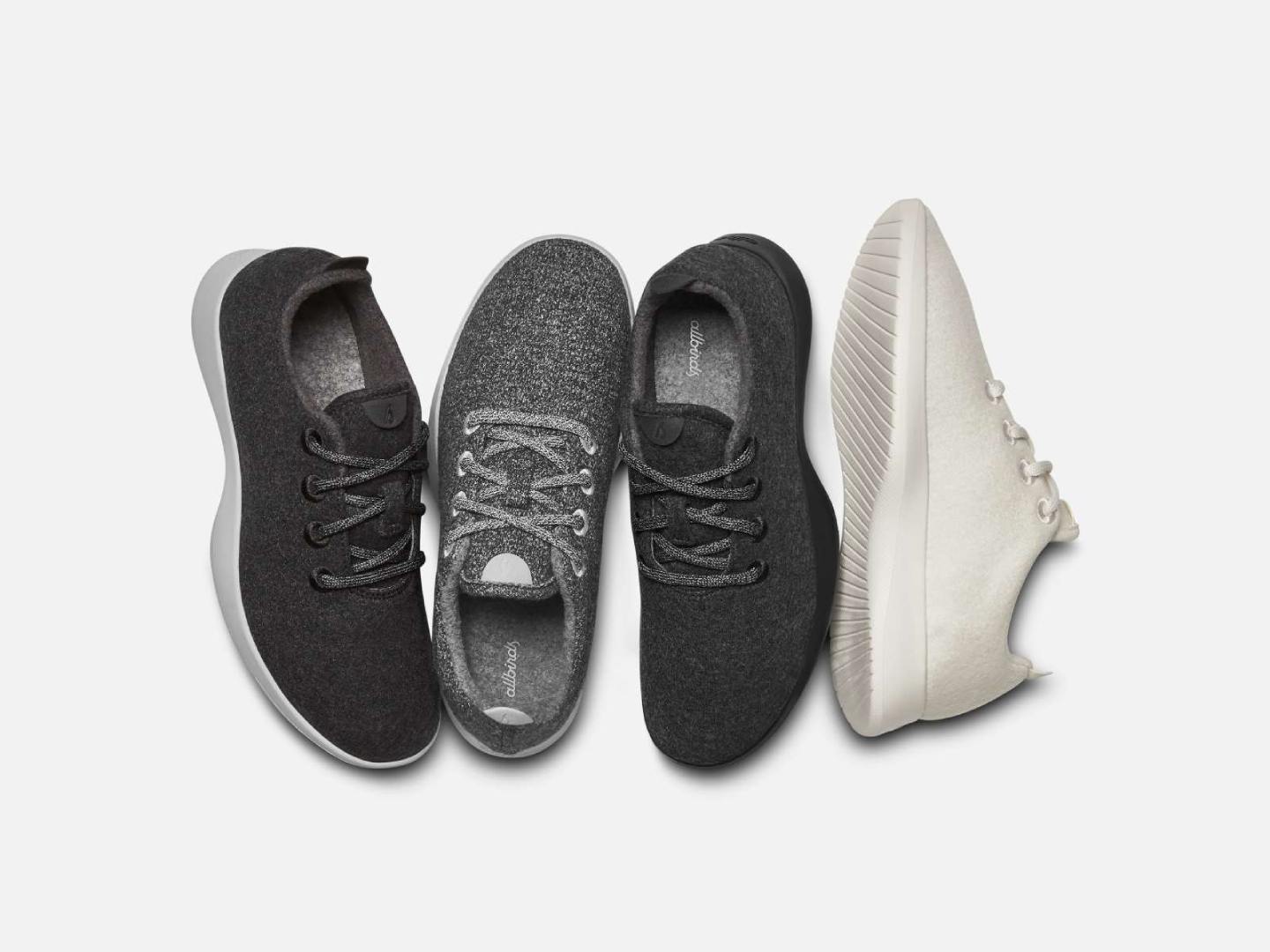
Score = 16
Natural materials 4/5, Use of plastics 4/5, Build quality 4/5, Social 4/5
Price range: £90 - £130
Vegan: No
Best ethical running shoe*
The mantra of Allbirds is ‘made from nature’, and that’s pretty much exactly what they do with their stylish understated range of ethical trainers. As a native New Zealander, founder Tim Brown, knew a bit about merino wool, and wondered if it could be integrated into footwear.
To make this happen Allbirds have developed a unique material that they call ‘TrenoTM’, a combination of merino wool, Tencell, a type of eco-viscose derived from eucalyptus trees, plus a small amount of recycled nylon, for added strength. This combination of materials produces a knitted upper that’s strong, moisture wicking, and environmentally friendly.
It also looks great, and has become the signature look of the brand, fitting just as well with a pair of gym shorts as it does with a smart casual outfit.
Their conscious attitude doesn’t stop there either. For their soles they use foam that’s derived from sugar cane, as well as carbon negative EVA. They also use castor bean oil in their inner soles, and recycled PET where plastic is needed. To cap it off, they deliver in boxes made from 90% recycled cardboard.
Allbirds are up there with our most recommended ethical trainer brands, and they sell one of the best ethical running shoes on the market (R), which is well worth checking out.
Ethletic
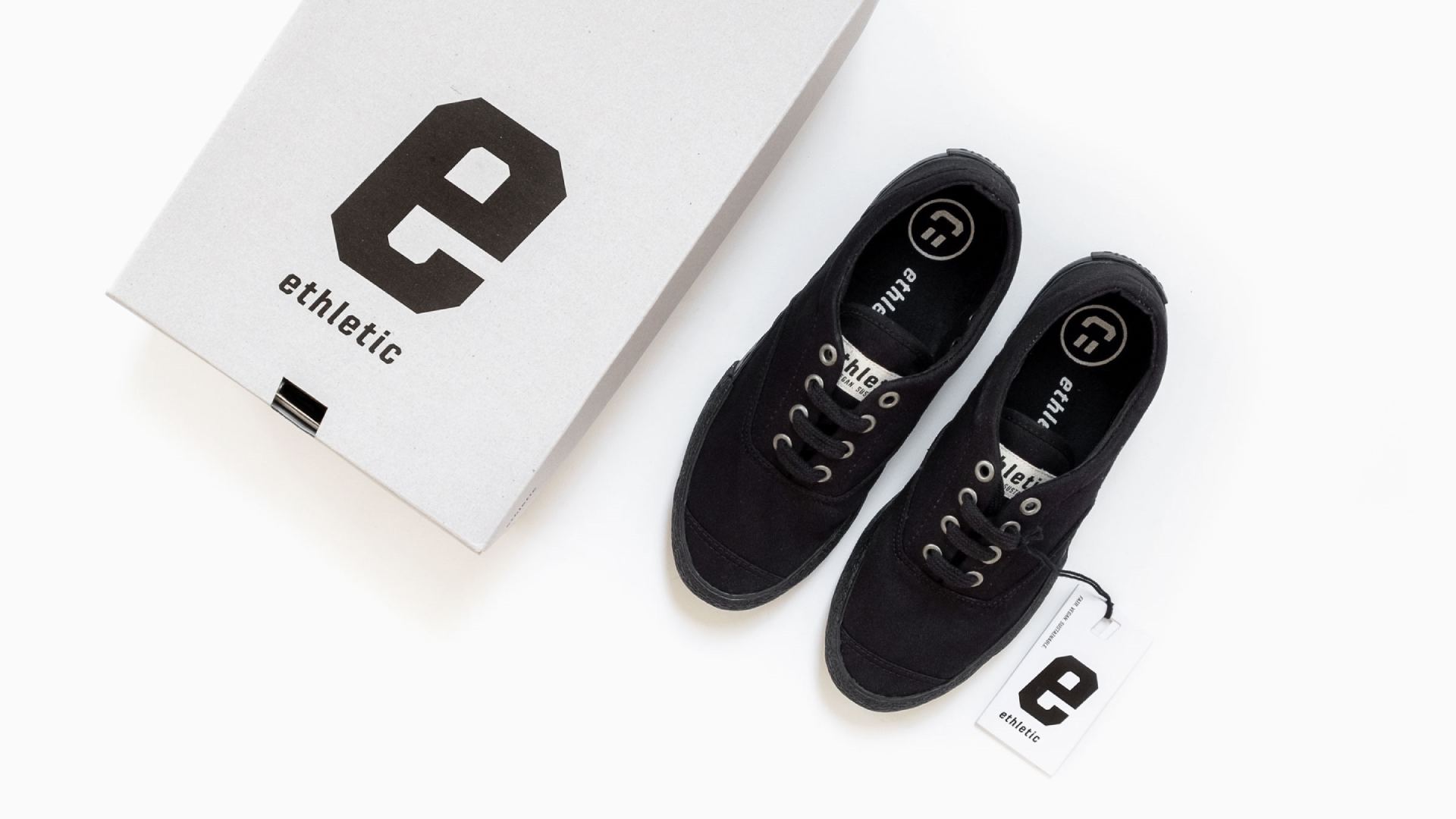
Score = 16
Natural materials 4/5, Use of plastics 3/5, build quality 4/5, social 5/5
Price range: £70 - £100
Vegan: Yes (all)
Berlin based Ethletic are another connoisseur of the Chuck Taylor look, with some Air-Jordan style alternatives thrown into the mix. They are best known for their extensive range of patterns and colours, allowing for a bit of sustainable exuberance.
They always use certified organic fair trade cotton, natural FSC certified rubber, and they’re strictly vegan in just about everything they do.
More than most brands, Ethletic are tightly connected to their production facilities in Pakistan. They have a program through which they donate $1 for every pair of trainers sold, which goes directly to the community that makes their products. And they offer a direct tipping system, so you can also donate as you buy.
Ethletic is a really fun brand that takes the environment and people’s rights seriously, so you can feel good about enjoying their products.
Good News
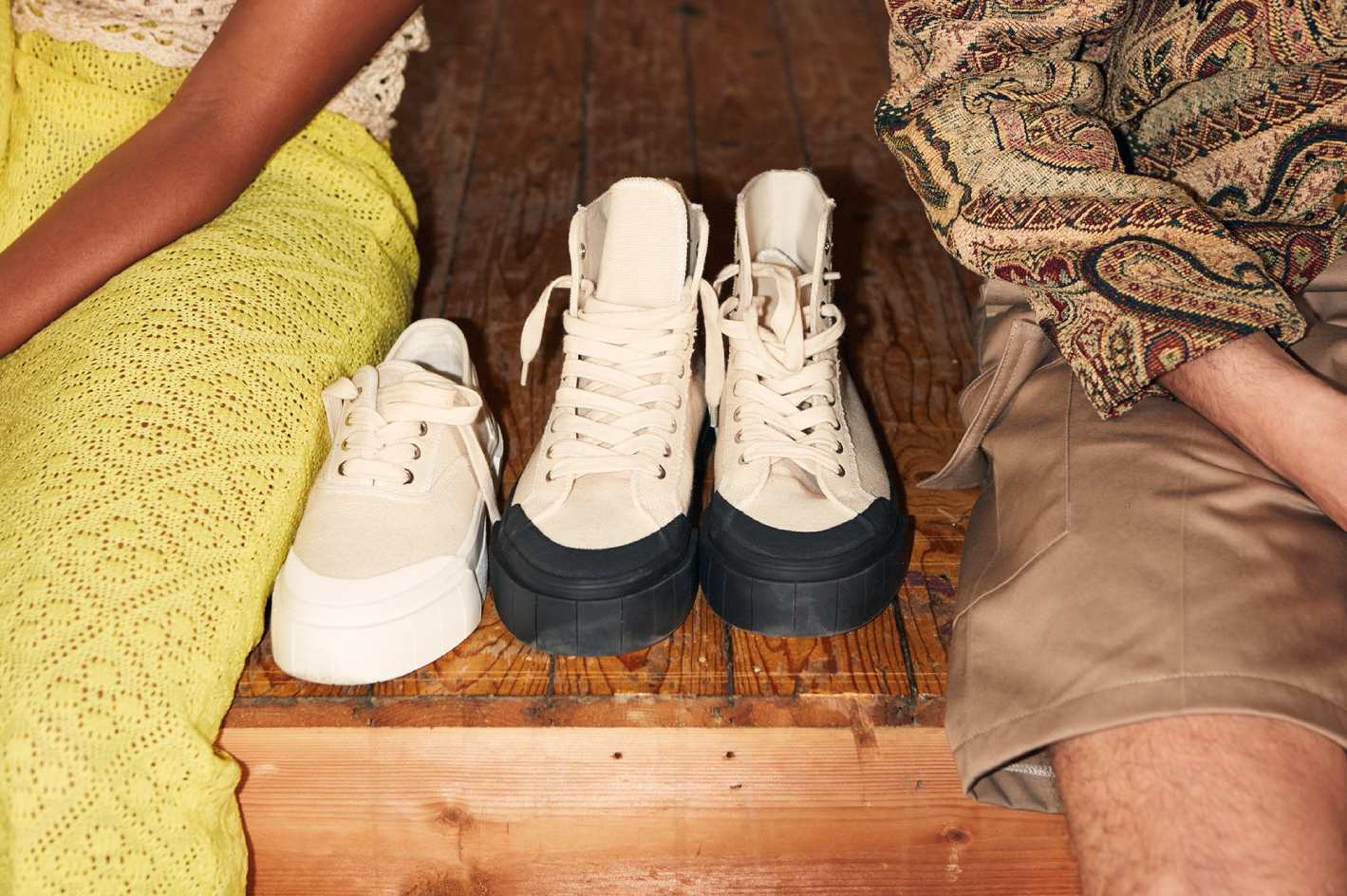
Score = 15
Natural materials 3/5, Use of plastics 4/5, Build quality 4/5, Social 4/5
Price range: £80 - £130
Vegan: Yes
Good News is a small London based brand making their own version of the timeless Chuck Taylor street sneaker, producing both hightop and low cut versions in various colours. They really specialise in this one style, and of course they look great.
Beyond the street chic image, they also make a genuine effort to design in a sustainable way with longevity, recyclability, ethical sourcing in mind.
The uppers, lining, and laces are nearly always made from certified organic cotton. Their soles, like those of Allbirds, are made using castor oil to minimise their use of petroleum based foam. Then the outer sole is made from recycled rubber, which is taken from old car tires. And best of all, this rubber can be recycled to make new shoes, with no decline in quality or surface texture.
If you like the Chuck Taylor style, and want to support a small ethical trainer brand, then look no further than Good News.
Po-Zu
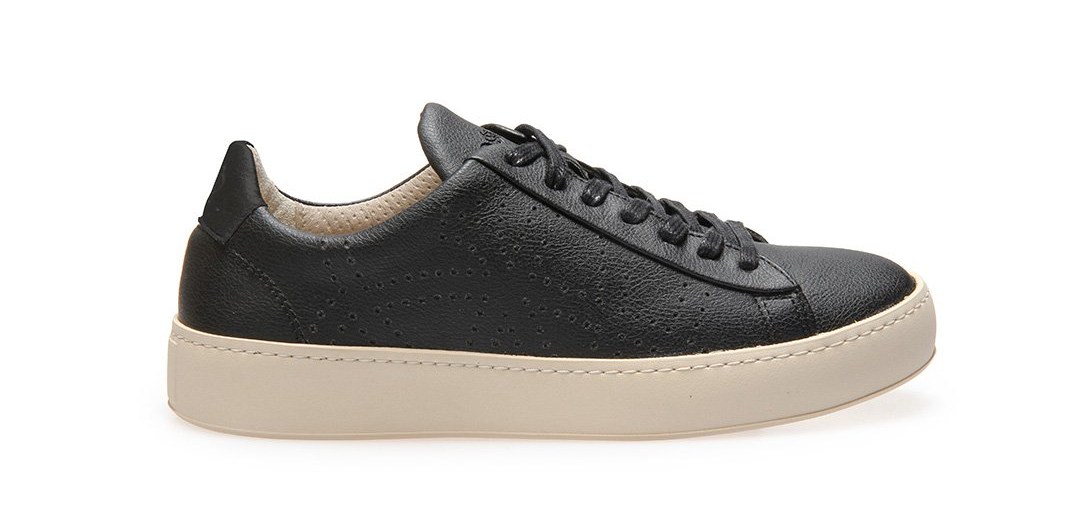
Score = 15
Natural materials 4/5, Use of plastics 3/5, Build quality 4/5, Social 4/5
Price range: £60 - £200
Vegan: Yes
For a brand making genuinely ethical trainers Po-Zu have a huge range of styles available, from leather boots, to slip-on summer wear. To achieve this, they use an equally huge range of sustainable materials, both old and new, including linen, organic cotton, wool, natural rubber, cork, apple skin leather, and piñatex. Plus, they have developed their very own Foot Mattress™ soles from coir, a mix of coconut husk and natural latex, creating a super comfy base that moulds to the shape of your foot, and alleviates pressure points.
When they use materials like eco-microfibre, commonly known as faux leather, they acknowledge that it’s not the best option in terms of the environment. A level of transparency self awareness you only get from brands that really care.
With Po-Zu you’ll almost definitely find something that suits you. They even do a range of stylish cosplay boots - no joke!
SAOLA Shoes
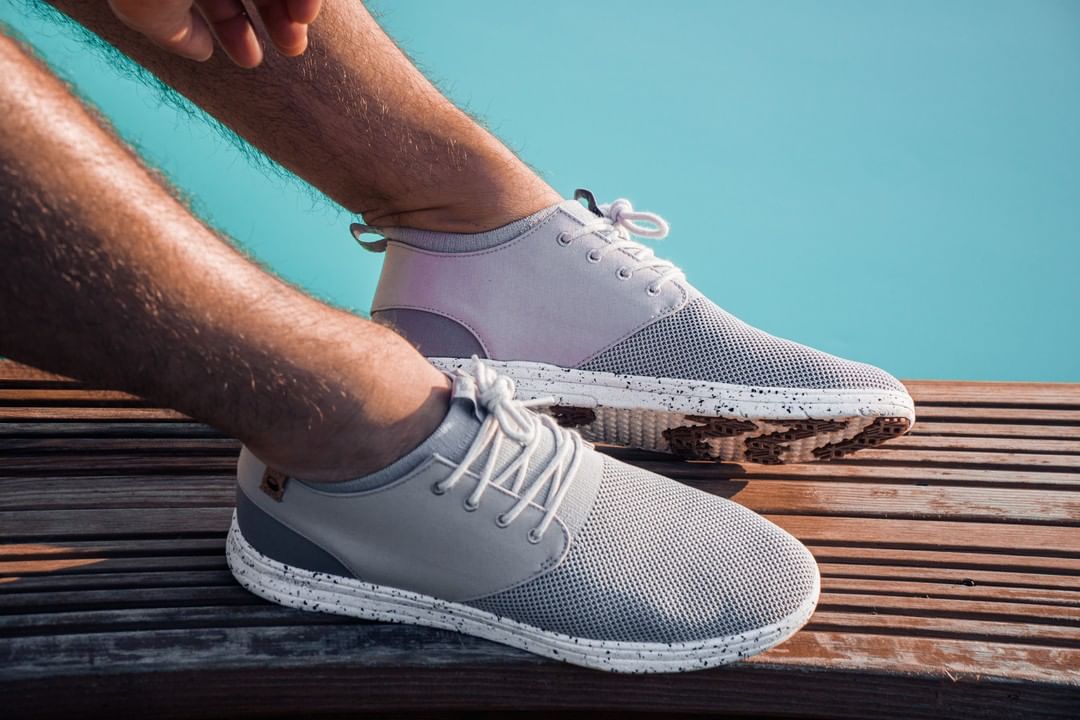
Overall Score = 14
Natural materials 3/5, Use of plastics 3/5, Build quality 4/5, Social 4/5
Price range: £70 - £110
Vegan: Yes
Saola shoes are a small brand based in France. Like Good News, they make a small range of styles, from a simple street sneaker to a slip on espadrille, all featuring a knitted upper.
They tick almost all the ethical boxes, using 90% recycled PET for the knitted upper, an insole of natural cork with BLOOM algae foam, and laces made from organic cotton. The only downside is that they use up to 80% EVA (derived from petroleum) in their outsole, which is not ideal. But overall they offer a pretty ethical and stylish option that you can proudly support.
Plus, they are committed to donating 1% of their turnover to animal trusts around the world. This might sound insignificant, but you can be sure that this figure is a decent chunk of their profit, so we salute this.
Vivo Barefoot
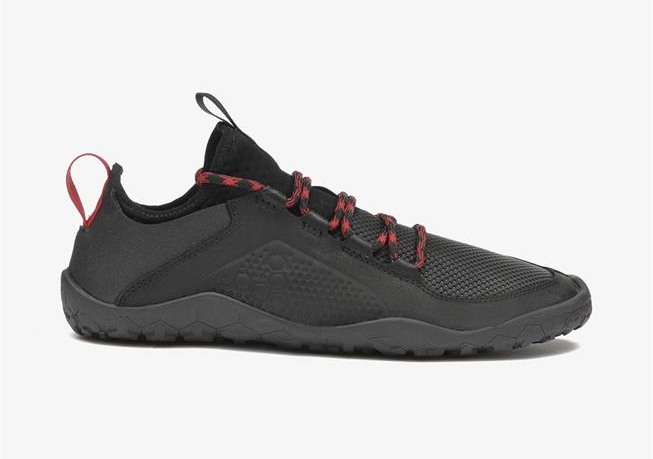
Score = 12
Natural materials 2/5, Use of plastics 3/5, Build quality 4/5, Social 3/5
Price range: £90 - £170
Vegan: Yes
Best all-round outdoor shoe*
Vivo Barefoot is one of the biggest brands that we feature on this list, and unlike the other brands here they have not built their business with sustainability as their main goal. However, they are a company that’s making a concerted effort to change the way they do things, which sets a great example to others.
Their sustainability push revolves around recycled PET which makes up 50% of their signature Eco-Canvas and Eco-Suede materials used in their uppers. They are also an early adopter of the BLOOM algae based foam technology.
They’re not the cleanest trainer brand in the world, but they are improving all the time. What’s very commendable is that they openly admit their shortfalls, whilst setting themselves clear targets for progress year on year.
Beyond environmental issues Vivo’s attention to the mechanics of our feet is really impressive, enabling them to produce some of the most innovative and comfortable trainers on the market.
Toms
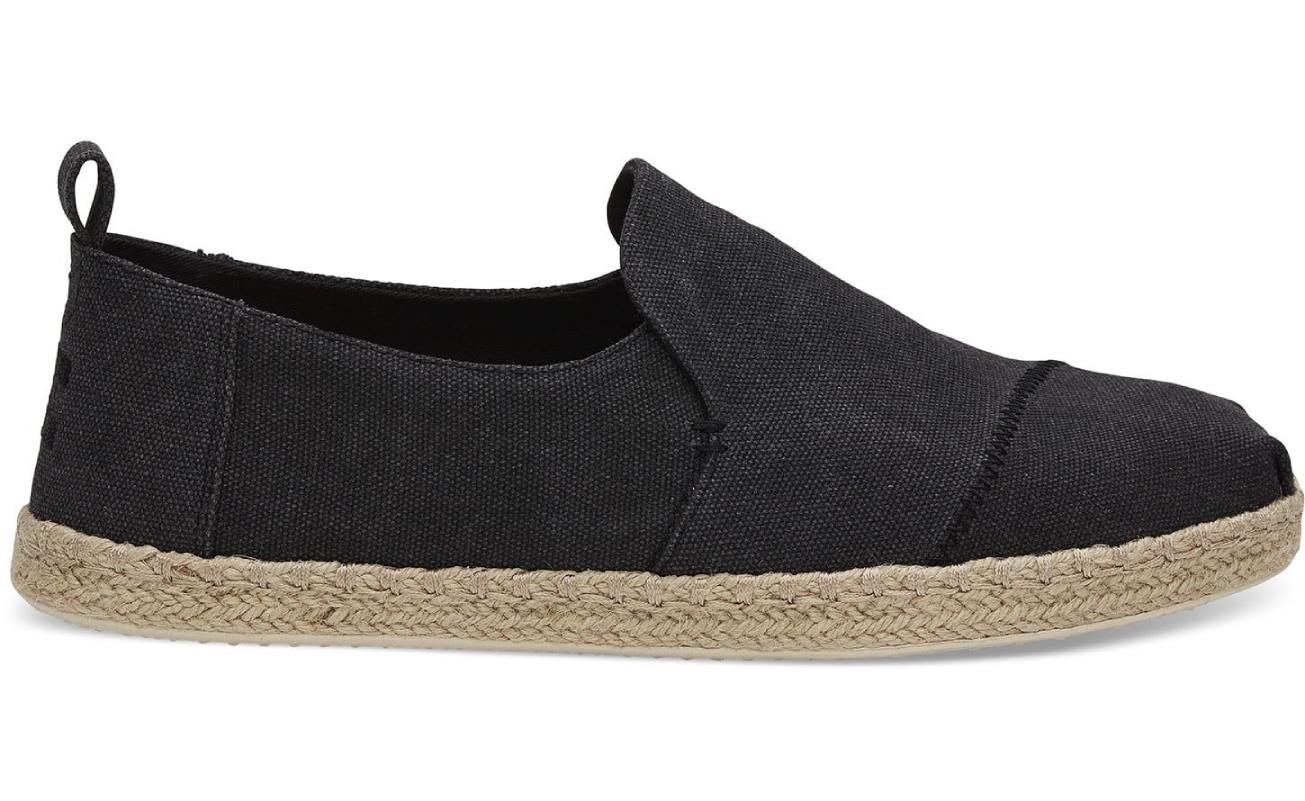
Score = 11
Natural materials 3/5, Use of plastics 2/5, Build quality 2/5, Social 4/5
Price range: £35 - £100
Vegan: Yes
Toms is another high street brand that you’ll probably recognise, and no doubt they offer the most affordable shoes on this list. Their version of an ethical brand is a little different to the others that we feature here.
Instead of focussing on the production and design, Toms have spent the last 13 years giving to people living in poverty across 85 different countries. According to their 2019 impact report they have donated 95 million pairs of shoes, funded more than 780,000 sight restorations, and created 722,000 weeks worth of safe water. Going forward they’ve also committed to donating at least 1/3 of all profits to the charitable section of their business. It’s commendable stuff indeed.
On the flip side not all of their range meets the strict criteria that we hope for when it comes to sustainable trainers, using a fair amount of virgin plastics in their manufacturing. The truth is ‘cheap’ and ‘sustainable’ just don’t go hand in hand.
However, they do use some recycled PET, and natural materials like linen, and jute. Plus, most of their soles are made from a hybrid of recycled plastics and plant based materials.
They also do have an EarthwiseTM collection, which is designed with more foresight for environmental impacts. So if you’re looking for an affordable and reasonably ethical trainer for the summer months, Toms EarthwiseTM version of their classic espadrille is a great choice.
Products to look out for
Here we feature trainers with some pretty ethical credentials, but they are made by brands who don’t yet do enough across their full range to make our main list.
Converse - Renew Cotton Chuck 70
£80.00

Converse is a big brand, owned by an even bigger brand (Nike), who have begun to make a concerted effort towards making more sustainable trainers. These signature style boots use recycled PET, and reground rubber with 40% waste canvas, to add this distinctive eco-version to their vast range of footwear.
Adidas - ULTRABOOST 20
£160.00
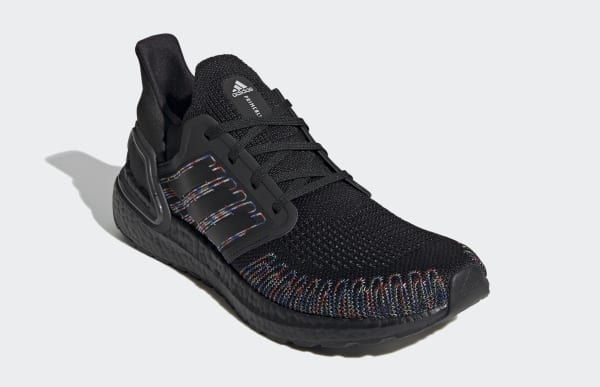
Adidas have made a huge contribution in the development of technology for producing sustainable trainers, although this is yet to transfer across to their full range of products. Here they feature recycled PET along with a slightly stomach churning narrative about saving the ocean. It’s a start from a big brand who are making strides in the right direction.
A red herring to avoid
Stella McCartney - Eclypse touch-strap sneakers
£455.00
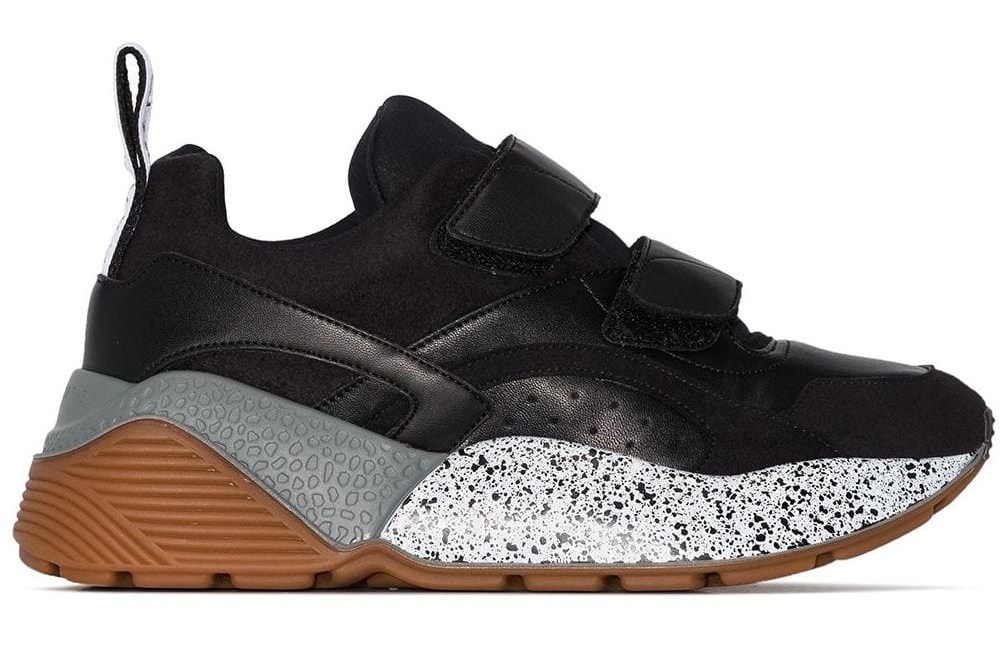
Costing more than an iPhone, these sneakers are definitely not a budget option, or an ethical option, unfortunately. As high fashion brands go Stella McCartney blows the sustainability trumpet more than anyone, and with their clothing line they do a very respectable job of staying true to this ethos.
We also cannot deny that they have acted as a fantastic voice, encouraging the fashion community towards more sustainable practice. Which makes it all the more disappointing to see them producing trainers made from 100% virgin plastics like this. They of all brands can do better.













 Be the first to know when Europe's top ethical brands are on sale, sign up to our newsletter here
Be the first to know when Europe's top ethical brands are on sale, sign up to our newsletter here